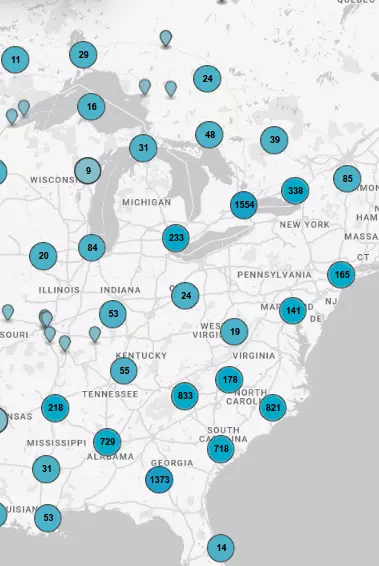Cheeves' Rice Mill
From the roof of Cheves´ rice mill (2 1/2 miles across the Ogeechee in the direction of the arrow) General Sherman and his staff watched the reduction of Fort McAllister, sunset, December...
- lat34
Capt. Nicholas Clinch
When called upon by a Union officer to surrender during Sherman´s assault, December 13, 1864, Clinch responded with a blow of his sword. After three sabre, six bayonet, and two gunshot wounds, he...
- lat34
Capt. John McCrady
Charlestonian, a student of Agassiz at Harvard, then professor of mathematics at the College of Charleston, he resigned his position at the outbreak of the war and became an officer in...
- lat34
Old City Jail
Built in 1912, this structure was originally a simple one-room brick cube with barred windows an an armored door. It was used to house offenders for short periods for fighting, public...
- lat34
C.S.S. Nashville
Built by William Collyer in New York City. She was ordered by New York merchants and launched September 22, 1853. Her maiden voyage was from New York to Charleston, South Carolina, under the...
- lat34
Tom Cat
The sole Confederate fatality after seven hours of intensive bombardment on March 3, 1863, by the monitors PASSAIC (Capt. Percival Drayton), NAHANT, and PATAPSCO, supported by the MONTAUK,...
- lat34
Position of the Monitors
The monitors took positions against the far marsh in the direction of the arrow, between 900 and 1200 yards from the fort during the following series of attacks: by the MONTAUK, January...
- lat34
Obstruction of River
To block the channel of the Ogeechee River, a double row of piling was placed across the river at a point opposite this marker. Georgia Historical Commission 1964 Plaque courtesy Lat34North.com....
- lat34
Major John B. Gallie
Killed in action while commanding the fort during the second attack of the monitor MONTAUK, February 1, 1863. The 32-pounder beside which he was standing was struck while Gallie was going from gun...
- lat34
Major Gallie's Gun
In this emplacement, chosen nearest the enemy, was the gun, an 8-inch columbiad, commanded personally by Major John B. Gallie. Georgia Historical Commission 1963 Plaque courtesy...
- lat34
Machinery From the C.S.S. Nashville
These portions of rotating machinery were removed, 1960, from the wreck of the Confederate blockade runner NASHVILLE, sunk in the Ogeechee River by shell fire from the U.S.S. MONTAUK in Feb.,...
- lat34
Hot Shot Furnace
The hot shot oven was used to heat cannonballs red hot to set fire to attacking wooden vessels. Georgia Historical Commission 1964 Plaque courtesy Lat34North.com. Original page, with...
- lat34
Hardwicke
This site on the Great Ogeechee, 14 miles from the Atlantic, was selected in 1755 by Governor John Reynolds for the capital of Georgia. He named it for his kinsman, Lord High Chancellor of...
- lat34
Bryan County
Named for the honorable Jonothan Bryan, Esq., 1708- 1788, founder, father, and patriot of Georgia. Erected by Adam Brinson I, Chapter, National Society, Colonial Dames of the Seventeenth century....
- lat34
Fort Argyle
Near here, on the West bank of the Ogeechee River, Fort Argyle was built in 1733, to command one of the main passes by which enemy Indians had recently invaded South Carolina, and to...
- lat34
Dead Town of Hardwicke
>>--8 mi.---> On May 10, 1754, GEORGE TOWN was established at the "Elbow" of Great Ogeechee River, eight miles east. In February, 1755, Gov. Reynolds, dissatisfied with Savannah as a capital and...
- lat34
Sinking of the CSS 'Nashville (Rattlesnake)'
In July, 1862 the CSS ´NASHVILLE´, Capt. Baker, ran the Union blockade and entered Savannah via Wilmington River with a cargo of arms. Loaded with cotton for Europe, she attempted to escape...
- lat34
Fort McAllister-10 mi.
>>--10 mi.---> Situated at Genesis Point, 10 miles east on the right bank of the Great Ogeechee River below the "lost town" of Hardwick, this fort was the right of the exterior line designed for...
- lat34
Old River Road
The highway northward is the Old River road, one of the earliest routes west of the Ogeechee and a leading way from Savannah to Georgia´s western frontier. It followed an old Indian trial...
- lat34
Fort McAllister-4.5 mi.
East 4.5 miles, on Great Ogeechee River, Fort McAllister was built 1861-62 to guard the ´back door´ to Savannah. During 1862-63, it repulsed 7 attacks by armored vessels, some mounting...
- lat34
